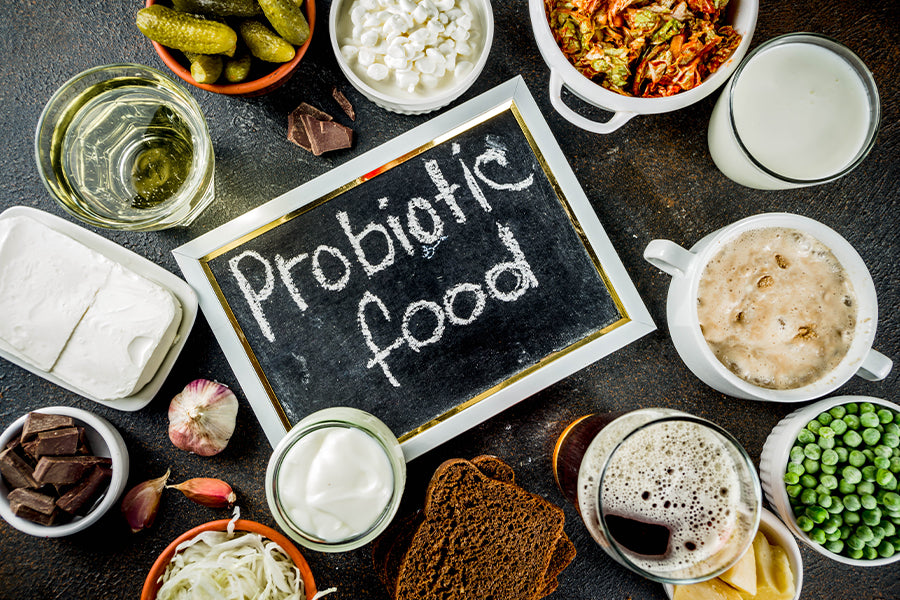Probiotics have gained significant attention in recent years due to their numerous health benefits. These live microorganisms play a crucial role in supporting our overall well-being, particularly when it comes to our gut health.
While many people turn to probiotic supplements for their daily dose of good bacteria, natural food sources can provide these beneficial microorganisms. In this article, we will explore six food sources of probiotics and delve into their incredible health benefits.
What are Probiotics?
Probiotics are live microorganisms that provide health benefits when consumed in adequate amounts. They are often referred to as "good" or "friendly" bacteria because they positively impact our overall health, particularly in relation to our digestive system.
Probiotics can be found in certain foods, and Probiotics 60 Billion CFU by DMoose supplements are believed to promote a balanced and healthy gut microbiota.
How Do Probiotics Work?
Probiotics work in various ways to support our health and well-being. Here are a few mechanisms through which they exert their beneficial effects:
Restoring Gut Microbial Balance
Probiotics help restore and maintain a balanced composition of the gut microbiota. They do this by inhibiting the growth of harmful bacteria and fungi, and by competing for resources with potentially pathogenic microorganisms. Probiotics promote a diverse and balanced microbial community in the gut and improve overall gut health.
Strengthening the Gut Barrier
The gut barrier acts as a physical and functional barrier, preventing harmful substances from entering the bloodstream while allowing the absorption of nutrients.
Probiotics help strengthen the gut barrier by promoting the production of tight junction proteins, which play a crucial role in maintaining the integrity of the intestinal lining. This helps prevent the leakage of harmful substances and reduces inflammation in the gut.
Modulating the Immune System
Probiotics interact with the immune system in the gut, helping to regulate its response. They can stimulate the production of anti-inflammatory substances while suppressing the release of pro-inflammatory molecules. This immune system modulation contributes to a balanced immune response and may help alleviate symptoms of certain immune-related conditions.
Producing Beneficial Substances
Probiotics can produce beneficial substances such as short-chain fatty acids (SCFAs) and vitamins. SCFAs are essential energy sources for the cells lining the colon and have been associated with various health benefits, including reduced inflammation and improved gut motility. Additionally, certain probiotic strains can synthesize vitamins like vitamins K and B, which are essential for our overall health.
Metabolizing Substances
Probiotics can metabolize specific compounds in our diet, such as dietary fibers and complex carbohydrates that are indigestible.
By breaking down these substances, probiotics produce metabolites that provide additional health benefits, including increased nutrient availability and the production of certain bioactive compounds.
It's important to note that different strains of probiotics may have varying mechanisms of action and health benefits. Therefore, choosing the right probiotic strain for a specific health concern is crucial.
In summary, probiotics restore gut microbial balance, strengthen the gut barrier, modulate the immune system, produce beneficial substances, and metabolize certain compounds. These collective actions improve gut health, immune function, and overall well-being.
6 Food Sources of Probiotics and Their Health Benefits"

Incorporating these six probiotic food sources into your diet is a delicious and enjoyable way to enhance your gut health. So go ahead, indulge in the creamy goodness of yogurt, embrace the tangy wonders of sauerkraut and kimchi, savor the umami-infused miso, and explore the plant-based delights of tempeh.
Your taste buds and your gut will thank you for it!
1. Yogurt - The Creamy Digestive Delight
Yogurt, the special creamy delight, satisfies your taste buds and offers various health benefits. Packed with live cultures like Lactobacillus and Bifidobacterium, yogurt supports your digestive system by promoting healthy gut flora.
Regular consumption of yogurt can improve digestion, prevent constipation, and alleviate symptoms of gastrointestinal disorders. With each spoonful, you're treating your taste buds while nourishing your gut.
2. Kefir - The Probiotic Powerhouse
Move over, yogurt, because kefir is here to claim the title of the probiotic powerhouse. This tangy fermented milk drink contains a rich assortment of beneficial microorganisms derived from kefir grains.
Kefir supports gut health and possesses a wider range of probiotics compared to yogurt. Incorporating kefir into your diet provides your digestive system with the necessary reinforcements to combat digestive issues, reduce inflammation, and even improve lactose digestion.
3. Sauerkraut - The Gut-Boosting Superfood
Sauerkraut, the traditional German fermented cabbage dish, might seem humble, but it's a gut-boosting superhero. During the fermentation process, the cabbage undergoes a transformation, becoming a tangy and flavorful source of probiotics.
Loaded with lactic acid bacteria, sauerkraut aids digestion, enhances nutrient absorption, and promotes the growth of healthy gut bacteria. It's time to give your taste buds a tangy treat and your gut the support it craves.
4. Kimchi - The Fiery Fermented Wonder
Prepare your taste buds for a spicy adventure with kimchi, the fiery fermented wonder from Korea. Packed with vitamins, minerals, and probiotics, kimchi is a true powerhouse of health benefits.
By incorporating kimchi into your diet, you're treating your taste buds to a symphony of flavors and supporting your digestive system. The probiotic content in kimchi helps maintain a healthy gut flora, leading to improved digestion, a strengthened immune system, and a happier gut.
5. Miso - The Umami-Infused Probiotic Elixir
Miso, the Japanese seasoning made from fermented soybeans, rice, or barley, adds an umami explosion to any dish. But it's not just about the flavor; miso offers many health benefits.
Packed with probiotic bacteria like Aspergillus oryzae, miso promotes digestion, enhances nutrient absorption, and supports a healthy immune system. So go ahead, savor the rich umami taste of miso while giving your gut the probiotic boost it deserves.
6. Tempeh - The Plant-Based Probiotic Champion
For all the plant-based enthusiasts out there, tempeh is your go-to probiotic champion. Tempeh is a fermented soybean product from Indonesia that packs a powerful nutritional punch.
Not only is tempeh a great source of plant-based protein, but it also contains probiotics that support digestion, promote heart health, and may even help reduce cholesterol levels. With tempeh, you can enjoy a delicious and nutritious meal while nourishing your gut with beneficial microorganisms.
Conclusion
Incorporating probiotics into your diet is a fantastic way to support your overall health and well-being. While probiotic supplements are readily available, including probiotic-rich foods can be equally beneficial.
Whether you enjoy yogurt, sauerkraut, or kombucha, these food sources provide diverse live microorganisms that support digestion, enhance nutrient absorption, strengthen the immune system, and promote optimal gut health.
If you're looking for a convenient and reliable probiotic supplement, consider trying "PROBIOTICS 60 BILLION CFU." This high-quality product contains a potent blend of beneficial bacteria strains, carefully formulated to support your gut health and overall wellness. With PROBIOTICS 60 BILLION CFU, you can harness the power of probiotics to achieve a healthier and happier life.











